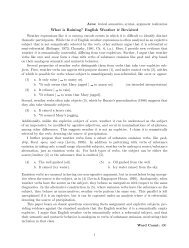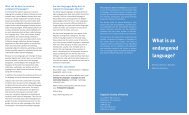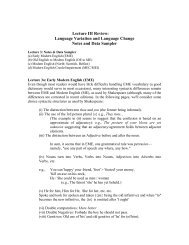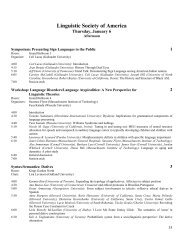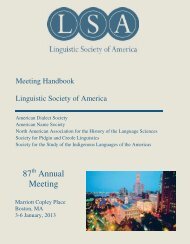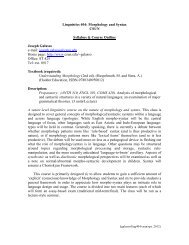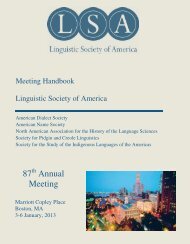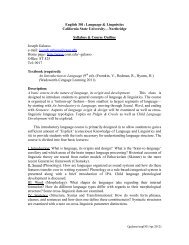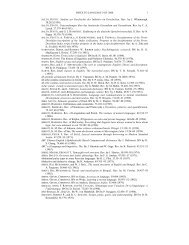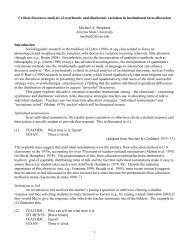View the meeting handbook - Linguistic Society of America
View the meeting handbook - Linguistic Society of America
View the meeting handbook - Linguistic Society of America
You also want an ePaper? Increase the reach of your titles
YUMPU automatically turns print PDFs into web optimized ePapers that Google loves.
Lise Dobrin (University <strong>of</strong> Virginia)Jeff Good (University at Buffalo, State University <strong>of</strong> New York)Endangered language linguistics: Whose mission?As <strong>the</strong> discipline <strong>of</strong> linguistics redoubles its efforts to document, understand, and support <strong>the</strong> world's linguistic diversity, academiclinguists are reconfirming <strong>the</strong>ir longstanding dependence on tools, methods, information, and facilities created by <strong>the</strong>ir missionarycounterparts, particularly SIL. But with linguistic work now <strong>of</strong>ten framed as a matter <strong>of</strong> human rights, endangered languages havebecome a moral cause. The time has thus come to reflect on how this partnership <strong>of</strong> convenience can be reconciled with academiclinguistics' own priorities and values. Is it desirable--or even possible--for endangered language research and development to becarried out independently <strong>of</strong> mission enterprises?William Svelmoe (Saint Mary's College)Missionary linguists or linguist missionaries? The tension between linguistics & evangelism in <strong>the</strong> SILThe earliest SIL/Wycliffe recruits were fundamentalist Protestants for whom linguistic training was a necessary evil, something oneendured in order to reach <strong>the</strong> more important goal <strong>of</strong> saving souls. However, mastering a field as complicated as linguistics required arigorous education far beyond what evangelical missionaries at <strong>the</strong> time customarily received. In time, and through a process <strong>of</strong>generational change, <strong>the</strong> organization underwent a radical shift. SIL now attracts pr<strong>of</strong>essionally trained linguists eager to unitepr<strong>of</strong>essional and intellectual goals with <strong>the</strong>ir religious commitments. But <strong>the</strong> tension remains, as recent discussions within <strong>the</strong>organization demonstrate.Courtney Handman (University <strong>of</strong> Chicago)Christianization & language ideologiesThe relationship between local language ideologies, people's attitudes about language function and use, and conversion to Christianityis especially consequential for endangered languages since many <strong>of</strong> <strong>the</strong>se are found in <strong>the</strong> remote areas that have long been attractiveto evangelistic organizations. Even when Christianity is practiced in local language contexts, beliefs about pragmatic constructs suchas sincerity or <strong>the</strong> representation <strong>of</strong> internal thoughts can shift in radical ways. I give a syn<strong>the</strong>tic overview <strong>of</strong> <strong>the</strong> literature on howChristianization and attendant practices such as literacy affect local language ideologies, situating SIL's goals and practices within thisbroader context.Patience Epps (University <strong>of</strong> Texas, Austin)Linguists & missionaries: An Amazonian perspectiveTaking <strong>the</strong> problem <strong>of</strong> language endangerment in Amazonia as a backdrop, I argue that <strong>the</strong> missionary endeavor is incompatible with<strong>the</strong> goals <strong>of</strong> language preservation and self-determination. Academic field linguists are increasingly aware <strong>of</strong> <strong>the</strong>ir responsibilities notonly to preserve and document endangered languages but also to respect speakers' rights to choose <strong>the</strong>ir own future. The missionaryendeavor, in contrast, takes as its starting point <strong>the</strong> assumption that 'we' have something that '<strong>the</strong>y' lack and are not complete without.Missionary linguists are also led by <strong>the</strong>ir premises to engage in coercion, as numerous examples from Amazonia attest.Ken Olson (SIL International)SIL International: An insider's viewMembers <strong>of</strong> SIL International are also simultaneously members <strong>of</strong> Wycliffe Bible Translators, which seeks to facilitate Scripturetranslation into <strong>the</strong> world's minority languages. SIL is incorporated as a nonecclesiastical organization in order to support <strong>the</strong>academic side <strong>of</strong> its work and to foster agreements with host governments, academic institutions, and international bodies such as <strong>the</strong>United Nations and UNESCO, with which it enjoys formal consultative status. In 1975, <strong>the</strong> allegation that SIL contributes to <strong>the</strong>destruction <strong>of</strong> indigenous cultures was formally brought to <strong>the</strong> Committee on Ethics <strong>of</strong> <strong>the</strong> <strong>America</strong>n Anthropological Association andwas found to be unsubstantiated.Daniel Everett (Illinois State University)On <strong>the</strong> LSA-SIL connectionSIL is ultimately a religious organization whose goal is to produce portions <strong>of</strong> <strong>the</strong> Bible in all <strong>the</strong> languages <strong>of</strong> <strong>the</strong> world so thatRevelations 7:9 and 5:9 might be fulfilled. I was an SIL member from 1976 to 2002 when I resigned, in part because <strong>of</strong> mymisgivings about SIL's training, advertisement, goals, methods, and institutional objectives. I discuss <strong>the</strong> nature <strong>of</strong> <strong>the</strong>se misgivingsand why I believe that although SIL continues to do invaluable linguistics research, it may be time for <strong>the</strong> LSA to develop an explicitpolicy concerning <strong>the</strong> role <strong>of</strong> SIL and similar organizations.92



